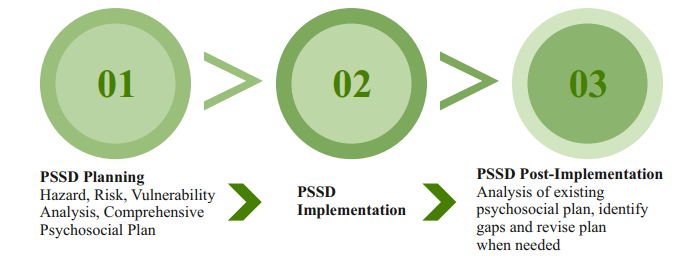Psychosocial Skill Demonstration
Psychosocial Skill Demonstration
- Phases in psychosocial skill demonstration
- The objectives of psychosocial skill demonstration are
- Steps in conducting psychosocial skill demonstration
- Significant components to be focused during psychosocial skill demonstration
- How to conduct a psychosocial skill demonstration?
- Outcomes of Psychosocial Skill Demonstration
Psychosocial Skill Demonstration (PSSD) helps in reviewing the psychosocial preparedness plan existing in the community or the organisation. This structured reviewing helps in evaluating the readiness to psychosocial care activities in the community during disaster times. It aims at evaluating the efficacy of psychosocial response plans during emergencies.
Phases in psychosocial skill demonstration

Psychosocial skill demonstration helps in formation and strengthening of psychosocial response teams. It also helps in assessing the knowledge and skills of psychosocial response teams on how efficiently they act in the provision of psychosocial care activities during disasters using the available resources. Along with assessment of knowledge and skills, it should focus on evaluation of existing protocols for psychosocial care services or formation of new protocols aiming at standardising psychosocial care activities.
The objectives of psychosocial skill demonstration are
- To review and revisit (if needed) the psychosocial care readiness plans during emergencies.
- To evaluate the systems available to cater psychosocial care services.
- To frame or strengthen Standard Operating Procedures (SOPs) for psychosocial care during emergencies.
- To sensitise multiple stakeholders on the roles and responsibilities in the provision of psychosocial care services.
- To foster coordination among stakeholders.
- To form psychosocial response teams.
- To generate public awareness on psychosocial care during emergencies.
- To identify the gaps in existing structures (resources including both structural and human resource, interaction and coordination).
- To enhance faster psychosocial response during emergencies.
Steps in conducting psychosocial skill demonstration
- Activities to be conducted prior to psychosocial skill demonstration Identify place and stakeholders (Government/ non-government organisation/ school/ community/ other agencies).
- Communicate to the agency.
Activities to be conducted on the day of psychosocial skill demonstration
- Assess the psychosocial knowledge and skills of stakeholders.
- Evaluate the available SOPs on administration of psychosocial care activities.
- Identify resources, systems and existing manpower.
Activities to be conducted post psychosocial skill demonstration
- Identify gaps in the existing structures.
- Reformulate SOPs and action plans.
- Create or recreate psychosocial response teams with updated knowledge and skills.
Significant components to be focused during psychosocial skill demonstration
- Psychosocial needs assessment.
- Trauma assessment.
- Psychosocial triage.
- Resources available.
- Effective use of resources.
- Awareness on Psychosocial Support and Mental Health Services.
- Staff efficiency in rendering Psychosocial First Aid and Psychosocial Care.
- Emergency Psychosocial Response.
- Coordination and Communication among Stakeholders.
- Stakeholders' Knowledge, Attitude and Practice related to Psychosocial Support and Mental Health Services.
- Available SOPs, Protocols, Plans and Systems related to planning, implementation and evaluation of psychosocial support and mental health services during emergencies.
How to conduct a psychosocial skill demonstration?
After adequate planning, the resource team visits the agency where the demonstration is planned, the psychosocial skill demonstration will be conducted. Following are the steps for psychosocial skill demonstration;
- Review of existing systems, resources, plans and protocols: The resource team interacts with the stakeholders on the available systems, resources, plans and protocols available in the agency in extending psychosocial support and mental health services during emergencies. Adetail reviewing of the available documents would help in understanding the existing facilitators and barriers to planning and implementing PSSMHS. The team also assesses whether a Hazard, Risks and Vulnerability (HRV) analysis and Resource mapping (RM) is done in the agency and reviews the blueprint of the HRV analysis and RM.
- Assessment of Participants' Knowledge on PSSMHS : This can be a structured interaction or evaluation of participants' knowledge on PSSMHS using appropriate assessment measures. This would reveal the stakeholders' actual understanding and awareness about the concepts related to PSSMHS.
- Practice based Stakeholder Skill Evaluation: Using case-based discussions and roleplays, participants' skills related to conducting psychosocial needs assessment, psychosocial triage, psychosocial first aid, psychosocial care, facilitating referrals and follow-ups are evaluated.
- SWOT Analysis: Based on the understanding from steps 1 to 3, the resource team identifies the strengths, weakness, opportunities and threats available in the agency with respect to planning and implementing PSSMHS during emergencies.
- Communication of the results: The resource team communicates the identified strengths, weakness, opportunities and threats to the agency. The communication should also provide information on stakeholder knowledge and skills, available resources, limitations and gaps identified.
- Strengthening of systems: Future plan of action to enhance stakeholders' knowledge and skills, establishment of systems, creation of service lines, encouraging stakeholder collaboration, updating or revisiting the plans and protocols related to planning implementation of PSSMHS.
Outcomes of Psychosocial Skill Demonstration
- Psychosocial skill demonstration acts as a medium to validate the psychosocial contingency plans and test the existing facilities and personnel responsible for administration of psychosocial care services.
- It helps in understanding the field challenges, shortages in the system, knowledge / skill deficits among stakeholders, predictive indicators of confusion and lack of SOPs.
- Understanding these limitations prior to impact will help in installing better protocols.
- It also provides hands on experience for stakeholders to improve their knowledge and skills.
- Conducting psychosocial skill demonstration strengthens the quality of psychosocial care services and enhances productivity of psychosocial care activities.
- It boosts confidence among stakeholders in planning and implementing psychosocial support and mental health services.
- It increases the level of preparedness and accelerates prompt response.
- It develops critical thinking, assessment skills and provides hands on experience.
- It fosters better communication and coordination between stakeholders and system.
Last Modified : 11/29/2023
This topic covers the information about National D...
This topic provides information about Emergency He...
This topic covers the information about Policies a...
Provides summary of District Disaster Management P...
